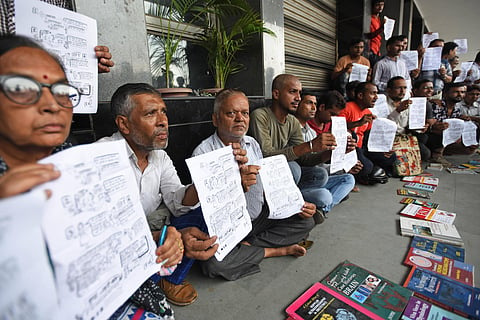Kanupriya Dhingra on the survival of Old Delhi’s book bazaar: Southasia Review of Books podcast #16
Welcome to the Southasia Review of Books Podcast from Himal Southasian, where we speak to celebrated authors and emerging literary voices from across Southasia. In this episode, Shwetha Srikanthan speaks to the book historian Kanupriya Dhingra about her recent monograph, Old Delhi’s Parallel Book Bazaar (Cambridge University Press, November 2024)
Tucked in the lanes of Old Delhi, the Daryaganj Sunday Book Market is a name that’s familiar to many. Synonymous with the sale of used, rare and pirated books since the 1960s, the bazaar continues to evolve over the years of its several relocations and regulations.
As a site of resilience and possibilities, the market also tells the story of Delhi’s urban aspirations, spatial politics, informal economies, and more. In this collective biography of the bazaar and its booksellers, Dhingra traces an ephemeral literary culture that has managed to survive in a world where printed words are as endangered as ever.
This episode is now available on Spotify, Apple Podcasts and Youtube.
Episode notes:
The death of a book bazaar: Delhi’s beautification drive comes at the cost of a historic Sunday book market - Kanupriya Dhingra (February 2020, Himal Southasian)
The fight for the commons: Who has the power to secure and legislate public spaces in cities? - Varun Nayar (May 2020, Himal Southasian)
Between the people and the polis: Southasia’s mega-cities and the urban future - Arif Hasan (November 2014, Himal Southasian)
Delhi, old and new - Kanak Mani Dixit (September 2009, Himal Southasian)
Nostalgia, secession and the absurdity of it all: Some reflections on the Indian city - Sunalini Kumar (June 2003, Himal Southasian)
Reframing the city: why Awadhendra Sharan’s ‘In the City, Out of Place’ might be the most important book on Delhi in recent times - Sunalini Kumar (June 2015, Himal Southasian)
Guided by history - Sohail Hashmi (June 2013, Himal Southasian)
Pirates of Pansodan street: A new copyright law may bankrupt Myanmar’s pirated book business - Adam Bemma (May 2020, Himal Southasian)

